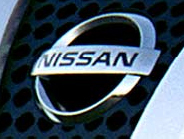Nissan Concept Car to Showcase Anti Drunk-Driving Technology
 |
TOKYO - August 3, 2007: Nissan Motor Co., Ltd. has revealed a new concept car featuring multiple preventative features designed to reduce drunk-driving. The various technologies are designed to detect the driver's state of sobriety and to activate a range of preventive measures including immobilization of the vehicle.
Alcohol Odor Sensors
 Shift Knob Sensor |
 Passenger Seat Sensor |
Facial Monitoring System
 Camera |
 Facial Image |
Driving Behavior
By constantly monitoring the operational behavior of the vehicle (e.g.
sensing if the vehicle is drifting out of its driving lane), the system can
identify signs of inattentiveness or distraction in the driver. When the
system detects such behavior, voice and message alerts are issued via the
navigation system. The seat-belt alert mechanism is also activated,
tightening around the driver to gain immediate attention.
This concept car was developed as an exploratory platform to showcase breakthrough technologies that could potentially be applied in future production cars, part of an ongoing program from Nissan contributing towards preventing drunk-driving.
Nissan has already launched and is developing several initiatives to help prevent drunk-driving. In June, the company introduced the "drunk-driving" message alert on its navigation system. In July, Nissan also began testing of a new on-board breathalyzer system in cooperation with several local government authorities in Japan, where an interlock mechanism will immobilize the vehicle if the driver's breath indicates the presence of alcohol above a specified level.
Nissan is taking a holistic approach towards safety that extends beyond the technology built into its vehicles. To achieve a "safe driving environment," Nissan has embarked on the Intelligent Transport System Project (ITS) in Kanagawa Prefecture - aimed at helping to reduce road accidents via the analysis of traffic data collected from on-the-road vehicles and traffic beacons. In Japan, the company's safety vision is to halve the number of traffic fatalities or serious injuries involving Nissan vehicles by 2015 compared with the level in 1995.



